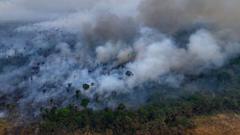Researchers report a staggering loss of 67,000 sq km of tropical forests in 2024, with the Amazon hit hardest. While Southeast Asia shows signs of progress against deforestation, the overall trend calls for immediate global action to prevent irreversible ecological damage.
Urgent Call for Action as Tropical Forests Face Unprecedented Loss

Urgent Call for Action as Tropical Forests Face Unprecedented Loss
Satellite data reveals record-breaking devastation of tropical forests in 2024, primarily due to fires, raising urgent concerns about climate stability and biodiversity.
The world's tropical forests, vital for mitigating climate change, suffered unprecedented destruction last year, as revealed by new satellite data. Researchers report a shocking loss of 67,000 square kilometers (about 26,000 square miles) of these essential ecosystems during the year 2024—an area roughly equivalent to that of the Republic of Ireland, translating to the loss of about 18 football pitches every minute.
Unexpectedly, fires have emerged as the leading cause of deforestation, surpassing agricultural land clearances for the first time in history. In particular, the Amazon rainforest has faced extreme hardships due to a record drought, exacerbated by climate change.
Despite this grim situation, there is some positive news from Southeast Asia. Countries like Indonesia have shown a reduction in forest loss by 11% compared to the previous year, thanks to effective government policies and community engagement focused on enforcing "no burning" laws, according to Elizabeth Goldman from the Global Forest Watch project at the World Resources Institute (WRI).
Tropical forests are reservoirs for hundreds of billions of tonnes of carbon, and their loss raises alarming questions about their ability to endure in the face of global warming. Researchers warn that certain sections of forests, particularly in the Amazon, may be nearing a critical point beyond which irreversible degradation could occur—a scenario described as "savannisation," where lush tropical landscapes convert to drier savanna ecosystems.
Prof. Matthew Hansen, co-director of the GLAD laboratory at the University of Maryland, emphasized the frightening implications of these findings, highlighting the risk of significant dieback in the Amazon should global temperatures exceed the 1.5°C threshold established by international climate commitments. This loss would not only threaten a rich diversity of wildlife but would also have profound consequences for the global climate system.
The last year saw an estimated release of 3.1 billion tonnes of planet-warming gases due to the record loss of old-growth tropical forests—a figure comparable to the greenhouse gas emissions of all the countries of the European Union combined.
However, experts like Rod Taylor from WRI noted advancement in efforts to combat these destructive trends. Despite previous successes in forest conservation in Brazil and similar countries, recent changes in policies have led to increased losses—underscoring the necessity for sustained and consistent protective measures.
With the upcoming UN climate summit COP30 taking place in the Amazon, researchers and policymakers are hopeful that promoting successful forest preservation schemes will be a priority. One potential initiative involves financially rewarding nations for maintaining their tropical forests, a strategy that Taylor believes could shift incentives from forest destruction to conservation.
This pivotal moment calls for collective global action and political will to ensure the world’s tropical forests are safeguarded against further loss.




















